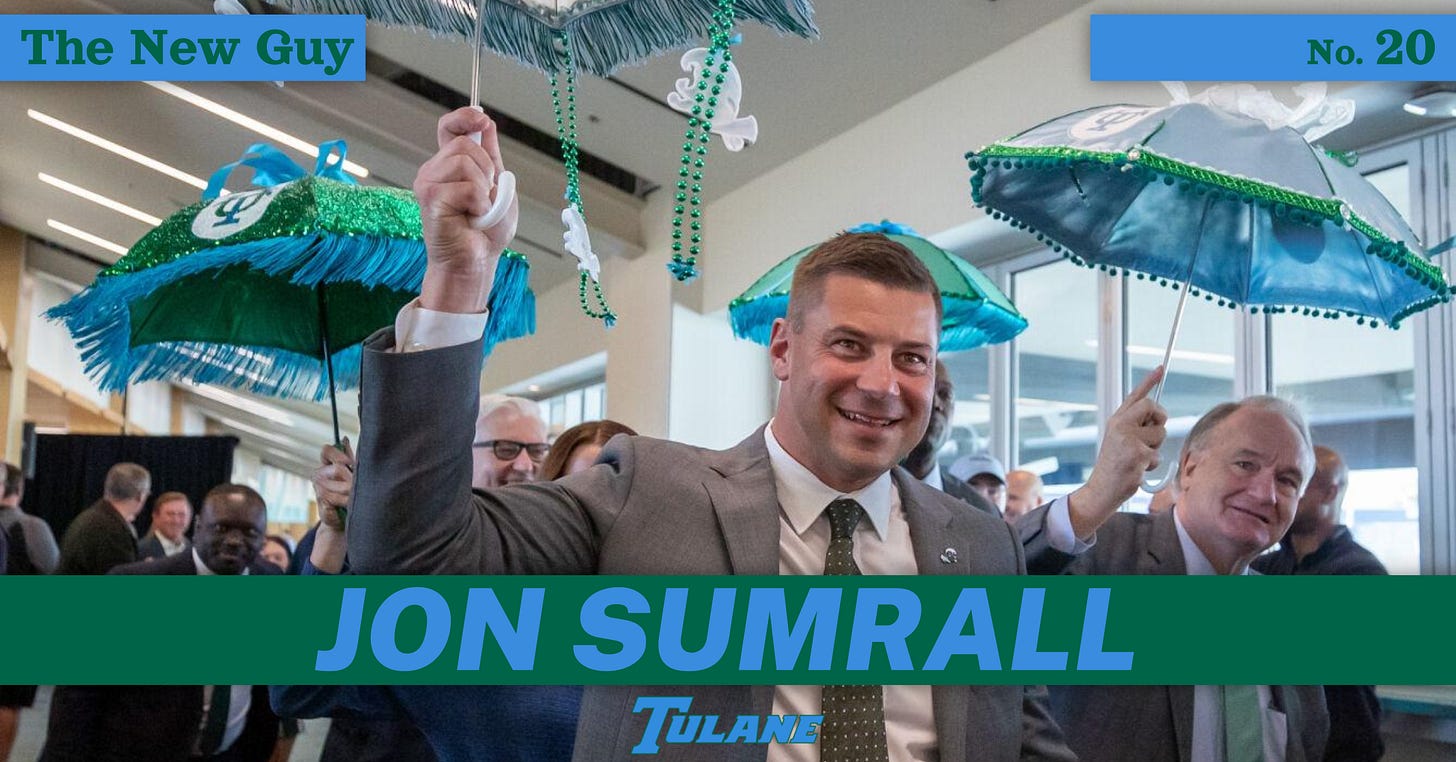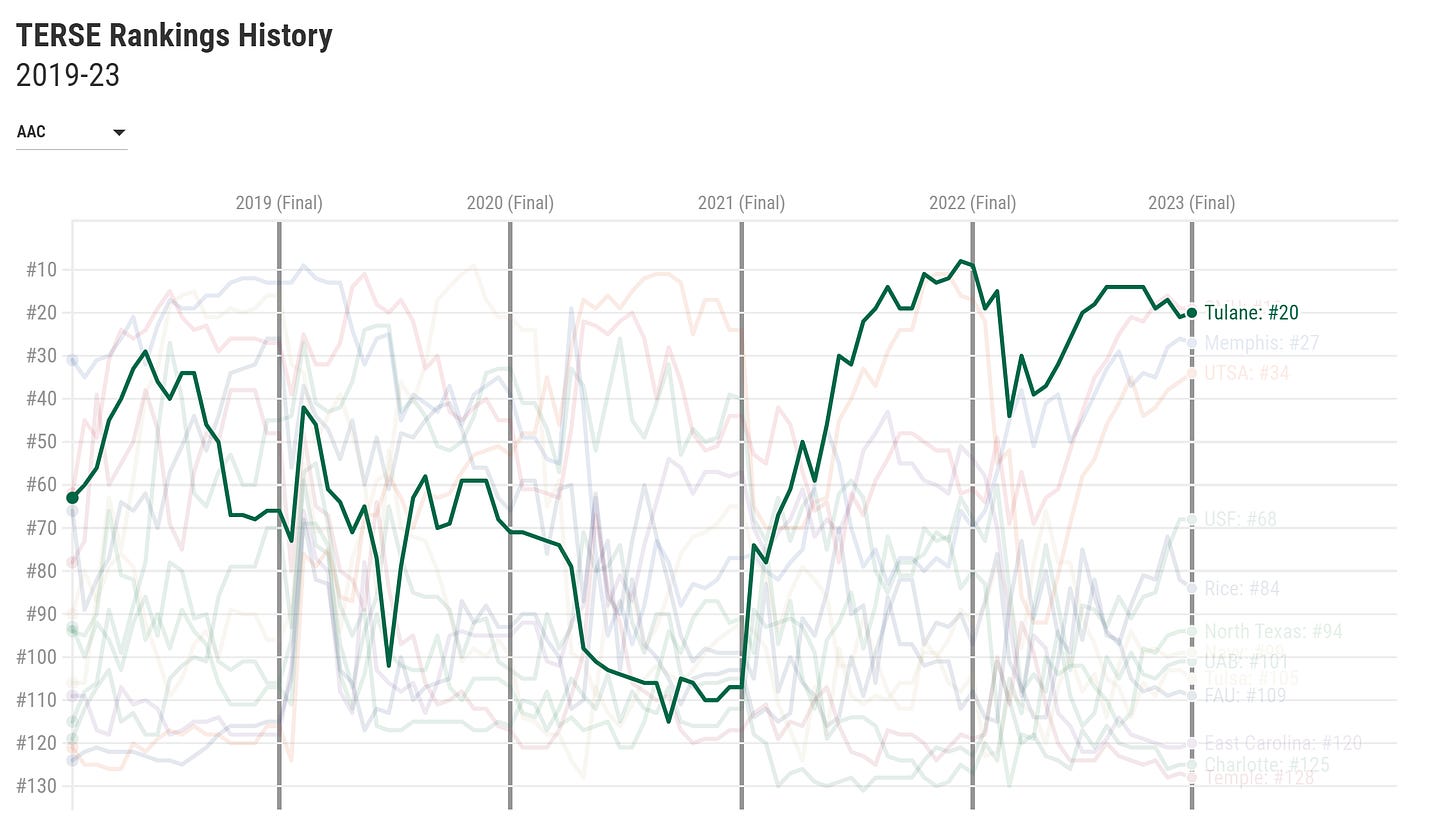Tulane keeps things simple with the superb Jon Sumrall
At a key juncture in the Green Wave's upward trajectory, there's no better time for such a slam-dunk hire.
Note: rankings for this series are set by the final 2023 rankings from TERSE, a D1 college football metric designed to imitate human rankings.
You’ve seen the usual pattern of a G5-to-P4 hire play out a million times before. It tends to be a very linear process; the college football coaching carousel is nothing if not efficient, and that tends to mean success or failure (and the results thereof) will come quickly most of the time. Rarely does a coach get promoted to the next tier of jobs after more than two or three seasons proving himself at his current stop—even if improvement comes later, it’s usually not enough to match the warning sign of a slow start.
Tulane, then, finds itself in a rather unusual situation. After some eight years leading the Green Wave, only turning them into a nationally relevant program in the last two, Willie Fritz has now earned himself a jump up to newly-christened power-conference program Houston. It’s a move that could only ever really happen because of Fritz’s storied reputation, established by more than a quarter-century of nearly uninterrupted excellence across various HC roles. Only at Tulane did he truly falter, and his recovery finally propelled him into the P4 job that he’s long looked destined for.
For the Green Wave, though, the legacy Fritz leaves behind is consequently a bit more complicated, even if it’s still indisputably good as a whole. In his last two seasons here, he led this program to a historic top-ten finish and Cotton Bowl win over USC, then followed it up with another strong season to mark Tulane’s first back-to-back years with AP Poll appearances since 1973-74. That’s a remarkably lofty ceiling for future coaches here to aim for…but Fritz’s tenure in Uptown also encompassed a long stretch much more typical of the program’s historical success. In his first six seasons, they went 31-43, never did better than 7-6, and headed into 2022 fresh off a miserable 2-10 campaign1 that brought up Fritz’s name in more than a few hot-seat lists.
Memories of how much worse Tulane could be, even under an excellent coach like the one now departing, are still pretty fresh as a result. There are no illusions that repeating the incandescent brilliance of the last two years will be easy—and for athletic director David Harris, appointed to the position just days before Fritz took the Houston job, the importance of making a strong pick for the Green Wave’s next coach was evident. At such a potentially pivotal point in program history, with the landscape of the post-realignment AAC still taking shape, a slam-dunk hire is exactly what you want.
Enter Jon Sumrall, who happens to be a perfect example of the rising G5 star who wins quickly and jumps to a bigger job in short order. After three straight five-win seasons under Chip Lindsey, Troy pivoted to the Kentucky (and former Tulane) DC, a decision that paid immediate dividends. After a 1-2 start to 2022, the Trojans won out and ultimately went a staggering 22-3 through the end of the following season, claiming back-to-back Sun Belt championships in the process. Working with limited resources at a program that was spinning its wheels in all respects upon his arrival, Sumrall instantly transformed them into a Group of 5 powerhouse and earned himself a well-deserved promotion to the AAC.
Going from Troy to Tulane might seem like something of a lateral move on the surface—neither has thrown around disproportionate weight in resources or realignment in the modern era—but the Green Wave have far more potential to invest significantly in football. It’s been the better part of a century since Tulane departed the SEC in part to cut down on athletic costs, and modern program leadership has been willing to fund sports at a competitive level, but facilities and recruiting strong enough to make a convincing P4 case are still a step above what they’ve done, at least for now. Harris (and university presidents Mike Fitts) could play a transformative role in the future of Tulane athletics over the next few years, but maintaining the momentum of the Fritz era falls on Sumrall’s shoulders more than anyone else’s.
There’s not much more to say, really, which is something of a breath air amid the chaotic environment of the 2024 college football coaching carousel. I don’t think there have been many outright bad hires this year, but there are certainly a lot that need close study to get a sense for how they fit the programs that made them. There’s a lot of value to defying conventional wisdom and targeting a coach who lines up particularly well with the profile a team needs to succeed, especially in an offseason with 32 coaching changes at the FBS level…but there’s nothing wrong with keeping it simple, either. Sumrall’s just a great coach, a proven winner with local ties who can clearly work with whatever he’s given, and that’ll always play. Dreams of joining the P4 themselves may be beyond Tulane for the time being, but they can take pride in having made a move that many power programs would dream of themselves.
The Last Five Years
Tulane’s similar records and results in 2022 and 2023 bely how different those teams were, and how much Fritz had to do to make sure they stayed on top. They were strong on both sides of the ball in the former season, but the offense took major strides from game to game, scoring 38 or more points in five of their last eight games (including against #22 UCF and #8 USC to end the years). In 2023, by contrast, they didn’t score 38 points in a single game all season, instead relying on a stellar defense that likewise didn’t allow any opponent to reach that mark until the season-ending Military Bowl. The latter is Sumrall’s specialty, and while it’s got some turnover to deal with, there are returns worth getting excited about with such an excellent defensive coach taking over.
True to form, Sumrall is already doing all the right things in his first few months at the helm. Navigating Tulane’s high academic standards, he brought in 23 transfers to reload the roster immediately after significant losses from the passing offense and defense. Meanwhile, he turned in a remarkably strong recruiting class despite the Green Wave’s coaching turnover, a group ranked third in the AAC by 247Sports that features multiple blue-chip pickups. The coaching staff looks good, too—Sumrall brought both coordinators with him from Troy, setting Tulane up with some of the key factors from his exceptional run with the Trojans. Regression is to be expected with pieces coming together from all over to reconstruct the roster and staff, but if anybody can find a way to make it work immediately, it’s Sumrall.
The Next Five Years
Just over a decade ago, a few hundred miles west of Tulane, another G5 program stood in a remarkably similar position to where the Green Wave are now. Houston was in the midst of a move from CUSA to the ascendant AAC, had recently started to find its footing under Art Briles and Kevin Sumlin after a long era of mediocrity following their departure from the SWC, and needed to make moves with the next realignment cycle in mind. There were growing pains along the way—the Tony Levine hire didn’t work out, Tom Herman was gone as quickly as he found success, and Dana Holgorsen’s teams bottomed out early in his tenure—but the promise the football program showed, and the investment Houston made in it as a result, ultimately earned the Cougars a bid to the Big 12.
That’s what makes this hire so important. Nothing is in the balance quite yet for Tulane; they didn’t have any urgent need to see Fritz win or lose out of the gate, and he rewarded them for that patience by putting them in the great position they now enjoy. But it’s growing ever more important for the Green Wave to take advantage of their circumstances, because as Houston shows, it doesn’t take long for a program with this much latent potential to move up in the world if they can tap into it. The clock’s already ticking on Tulane’s chances to take that next step and make themselves an attractive realignment candidate: in about six years’ time, either they’ll be in the conversation or they won’t.
Fitts’s willingness to invest in athletics and Harris’s ability to drive funding for football will largely decide whether Tulane can follow in the Cougars’ footsteps, of course. But both of those rely heavily on what Sumrall can accomplish out of the gate—continuing and building on Fritz’s success is a prerequisite for almost everything else they could do to make further moves. Now, more than ever, the Green Wave need a coach they know can run a competent, excellent program and keep winning, and hiring someone who was seen by many as a nascent candidate for major SEC jobs is a huge step in the right direction. It’s hard to imagine a better man for the moment than Sumrall, and I can’t wait to see what he’ll do with the immense opportunity in front of Tulane.
A season which was also marred by the team’s temporary relocation amid Hurricane Ida and a series of decimating injuries, admittedly.




